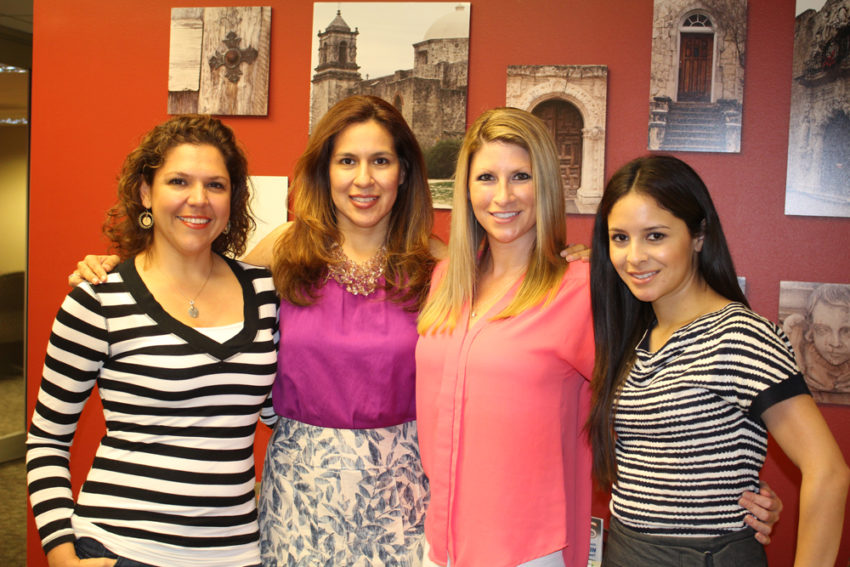
Share On Social!
Amy Cleveland, fresh out of college and just starting a career in marketing, discovered a coarse lump in her breast while putting on some tanning oil.
Only age 22, she was diagnosed with breast cancer.
“It was a struggle for me because I was young and there was no one my own age I could relate to or confide in about having cancer. People always say, ‘My mom had that,’ or, ‘My grandma had that.’ But it’s tough for young people,” Cleveland said.

Fortunately, Cleveland—now age 28 and free of cancer—found some “Breast Friends Forever,” thanks to a unique support group for young breast cancer survivors developed by the Institute for Health Promotion Research (IHPR) at the UT Health Science Center at San Antonio and Susan G. Komen San Antonio.
The BFF support group meets bimonthly to help young survivors bond with each other, get emotional support, and learn more about breast health from expert speakers.
“We want young survivors to build positive relationships with other survivors their age in a fun and educational setting, to improve their quality of life during and after breast cancer,” said Sandra San Miguel de Majors, a research instructor at the IHPR. “The BFF group is much-needed because breast cancer rates are rising about 2% a year in women ages 20-39.”
Breast cancer in younger women often is more aggressive with lower survival rates.
The estimated 250,000 U.S. breast cancer survivors diagnosed at age 39 or younger also face different challenges—such as dating and body image issues and starting a career and/or family and having to deal with chemotherapy treatment—than women diagnosed after 40.
San Miguel de Majors said young survivors often have few people to lean on.
“Through our research and outreach work I realized there are no support groups specifically for young breast cancer survivors. I thought, ‘Why not start one?’” said Sandra San Miguel de Majors, who oversees outreach for Redes En Acción, the IHPR’s national Latino cancer research network funded by the National Cancer Institute, and also sits on the board of directors for Komen San Antonio.
A few months ago, San Miguel de Majors brought her idea for a young survivors’ support group to Elyse Alaniz, mission director for Komen San Antonio. They recruited three young survivors—Cleveland, Brenda Garza, and Tanya Del Valle—and formed a planning committee.
They wanted to invite young survivors to meet periodically to share their cancer experiences, bond emotionally, and learn from each other.
But they wanted to offer more than just peer support.
“The element of practical support often is overlooked. At each BFF meeting, we bring in a medical expert to teach survivors about healthy lifestyles, or schedule community service projects,” Alaniz said. “We want to do even more, too, like conduct a healthy cooking demonstration or organize a group exercise session.”
At the first BFF meeting in June 2013, several survivors traded stories, laughed, and enjoyed food at Rosario’s Mexican Cafe y Cantina. At the second meeting in August, 15 survivors learned some nutrition and exercise tips from local oncologist.
Now more than 20 survivors regularly attend BFF meetings.
The BFF group now is reaching out to more young survivors through a web page and Facebook group page, while also giving back: On Oct. 30, 2013, the group will meet at a local eatery to increase cancer awareness, raise funds for underserved women and support one another.
“We really want to take a comprehensive approach to help young survivors in every way possible,” San Miguel de Majors said.
Dr. Amelie G. Ramirez, who directs the IHPR and the Redes network and sits on Komen’s national scientific advisory board, is excited about the group’s potential.
“It is fantastic to see this group taking many angles to address the gap that exists for support for young cancer survivors, especially Latina survivors,” Ramirez said. “I’m proud of Sandra for taking the initiative to find another way to help cancer patients.”
Cleveland is glad young survivors have a place to go where they can feel comfortable.
“I’m always telling my friends about this group, and that, while cancer can strike at a young age, you’re not the only one,” she said. “There is a group out with women in it who have been through what you’re going through, and can help.”
Explore More:
Healthcare AccessBy The Numbers
25.1
percent
of Latinos remain without health insurance coverage



